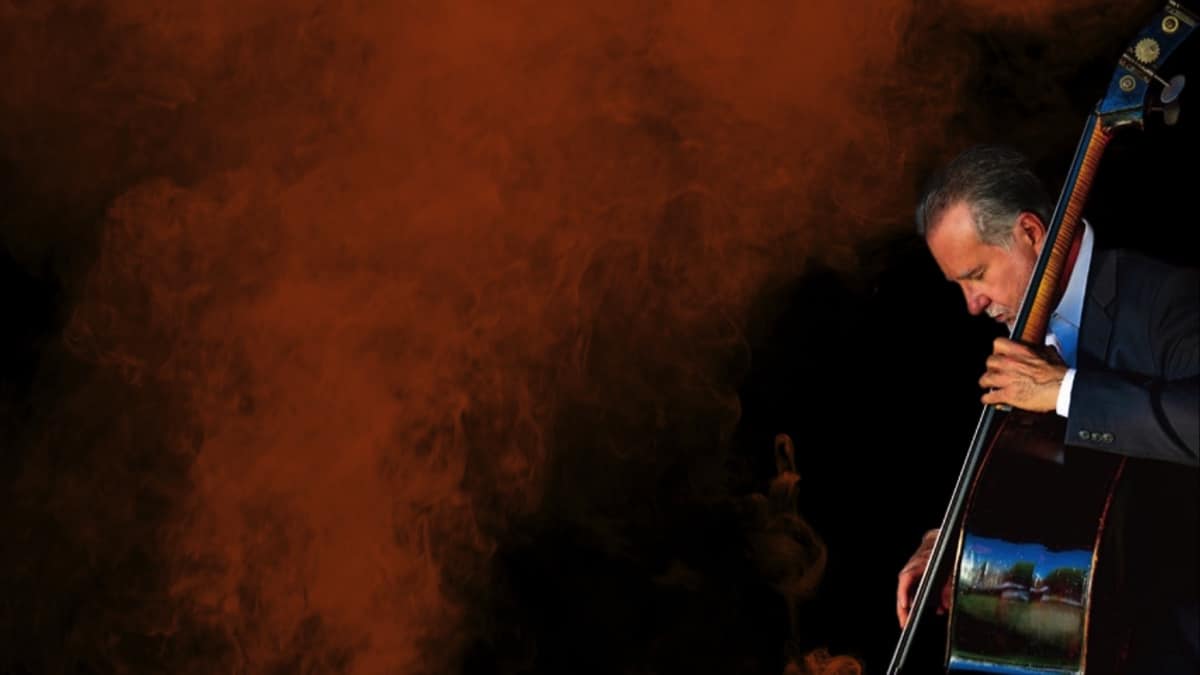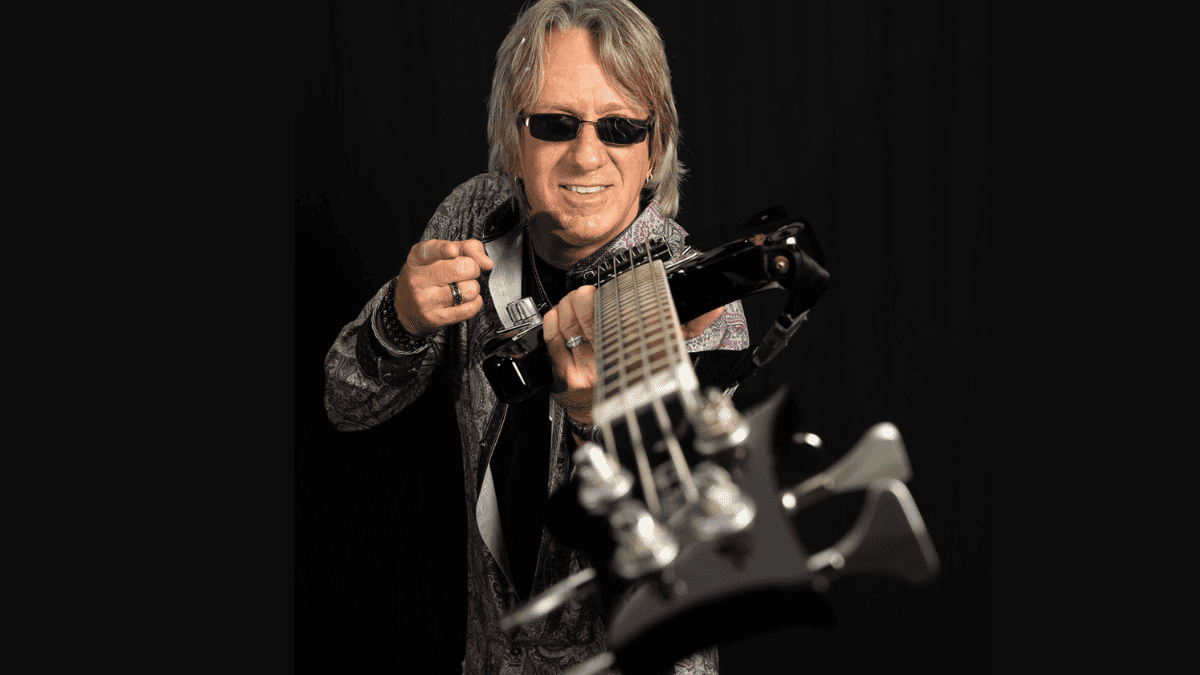Cover
Bass Musician Magazine: Dec07/Jan08 Issue Featuring Nathan East

Interview with Bassist Nathan East –
With a resume and discography second to none, Nathan East has set the standard for the consummate working bassist. Being a regular fixture with the best in the pop rock/rock world, and equally at home in the jazz world as well, he has produced decades of flawless lines with his trademark “perfect feel”, no matter what the musical context, and there seems to be no slowing him down. I marvel how this man can go from an Eric Clapton session to a Herbie Hancock session and just musically “get it”.
His band Fourplay has a 15-year legacy, and recently released their 10th album that sounds as fresh as their first. The respect from his peers is unquestioned, and his respect right back to them shows the depth of this man’s character, and the commitment he has to his craft and his colleagues. It’s one thing to throw together a few lines of praise on someone, and another when it’s almost not enough said. That would be Nathan.
JK: Your discography is nothing less than amazing. The art of genre leaping (no easy task) seems to be an effortless part of your musical makeup. I’m sure being successful in this part of the business encompasses a number of dynamics to be considered. What might those be in your opinion, and what might one focus on to bring that side of their artistic makeup into play?
NE: I think there are really only two kinds of music… good music and bad music. Fortunately, I’ve been blessed with the opportunity to play lots of good music with some amazing musicians! I focus on keeping my standards high and really listening to what’s going on around me. My musical vocabulary is broad enough that I’m able to cover a lot of ground when it comes to “genre leaping”. I enjoy the challenge.
JK: In our review this issue of Foreplay X, Damien speaks of your ability to create a deep, yet restrained pocket, as well as mentioning how you make the track really happen while not playing in a way that really makes your presence overwhelming. If there were a way to describe how you’ve mastered that part of your playing, I’d love to hear it.
NE: It’s always a work in progress for me but with experience comes confidence about choices of what to play and when. There is value in the space around the notes… what you don’t play becomes as important as what you play. Keeping it simple and carving out a deep groove is my basic approach, which is fun. A little discipline goes a long way and when you do decide to insert a little extra creativity, it means that much more.
JK: As busy as you are with your touring schedule, I know that you do quite a few clinics literally all over the world. As a clinician, what do you try to focus on in your presentation?
NE: My approach to clinics is not too academic. I like to incorporate examples of the music I’ve been involved with and demonstrations of how I approach creating a bass part. I focus on the primary role of the instrument and how to keep it interesting. I also encourage questions from everyone in attendance, as it’s a great opportunity for me to know what people are really interested in learning.
JK: Beyond touring, recording, and clinics, do you find any personal time for shedding in your schedule, and depending on your answer, let me phrase that another way. “If” you had time for practice, what would you be focusing on?
NE: I find that I am playing most of the time and don’t have a lot of time for shedding on my own. I used to have more guilt about not practicing enough but since playing with Herbie (Hancock), I’ve discovered that one of the most opportune times to practice is actually on stage during the performance! He said that Miles (Davis) used to tell the band not to come on stage playing what they practiced in their room. Miles said, “I pay you to practice on stage!” Now obviously, at some point the dues have to be paid, but I get the concept of not being locked into performing an exercise you practiced over and over in your bedroom. I would however focus on any difficult bits of the music that I’m expected to perform. Of the more challenging works to focus on when practicing, I’d say Jaco always comes to mind.
JK: Last issue, we presented a question to our staff members, that being—What player (or players) would you recommend giving a listen to, that in the sprit of Jaco and the innovation he brought to us is on the same path in your opinion as far as stretching the boundaries yet again on this instrument, and focusing on exploring the possibilities of its continued evolution. Your choice was the great bassist Pino Paladino. Could you articulate what it is about Pino’s musical approach that has captured your admiration?
NE: I just think Pino has some great ideas and his harmonic approach to the instrument is very special. He’s not afraid to play chords and double stops and uses them very creatively. His understanding of the big picture is keen and he knows when to step out there and when to hold back. He just gets it …a wonderful player and a great guy!
JK: What motivated you to create your DVD, “The Business of Bass”?
NE: I wanted to make a DVD that addressed some of the most frequently asked questions I get and basically create sort of a music clinic in DVD form.
JK: I recently caught a show on cable called Herbie Hancock- Possibilities. It showed the (and I don’t use the term lightly) genius of this man as he created a tune in the studio with a number of different artists. I also feel compelled to mention the final thought he shared at the end of all the sessions–that being–“I’m not a musician, I’m a human being–music is just what I do”. I know you just worked with him fairly recently, and I wondered if you could share your thoughts on what it’s like for you working with this particular “human being,” and if there’s a particular focus you feel you have when your working with him, what might that be?
NE: Working with Herbie is like going to school. He is of a brilliant mind and genius is quite an appropriate word to use when describing him. He has the ability to instantly raise your standards and without telling you what to play, greatly influences your approach. He’s one of the most challenging players to play with and listening is key when playing with him (as it is with anyone). Herbie’s mind is so advanced that it almost feels like he is miles ahead of the rest of us mere mortals and keeping up is more than a notion. The primary focus for me is having my internal time clock locked in place, I like to refer to it as my GPS system and as long as you know where you are at all times, you can participate in the party. He’s a wonderful musician and an exceptional human being. It’s nothing less than a true pleasure and honor to work with such a man.
JK: Thanks for your time Nate, and could you tell us what’s coming up for you in late 07 and early 08 that we can watch out for.
NE: I’m finishing my touring commitments with Herbie for the rest of 2007, which have been a lot of fun. In 2008 I plan to record a new Fourplay CD and tour with the band. I will also be involved as Musical Director for a concert sponsored by Yamaha that will take place during the NAMM Show in Anaheim on January 18.
For more information visit www.NathanEast.com
Bass Videos
Brian Bromberg, Paying Tribute to Scott LaFaro, April 2024

Brian Bromberg, Paying Tribute to Scott LaFaro, April 2024…

Brian Bromberg is one heavy-hitting bass player and I am in awe of his talent as one of the few individuals who is equally proficient on electric and upright bass.
You might remember our conversation back in 2018 when he released his powerhouse Funk album. Brian’s “A Little Driving Music” album is a staple on all our road trips and his Jaco and Jimi Hendrix tribute albums are mind-blowing… and I could go on and on.
Now, Brian has taken on the arduous task of producing an album paying tribute to the late, great, Scott LaFaro. He teamed up with pianist Tom Zink and drummer Charles Ruggiero and Brian delivers a commanding performance on upright. The entire album is a masterpiece and a real treat to listen to track after track.
Join us as Brian shares the details behind this project and more.
Photo, Michel Bocandé
Featured Videos
Visit Online
brianbromberg.net
FB @BrianBrombergBassist
YouTube
Cover
Leland Sklar, Over Half a Century of Bass, March 2024

We all have enjoyed Leland Sklar’s Bass lines for over half a century.

You might remember that we had him on our cover back in 2017 and did an update when he launched his book “Everybody Loves Me” in 2020. It was exciting to hear that The Immediate Family had got back together in the studio to work on their own music in 2019 and are now up to two albums.
Just last December, Magnolia Pictures released a documentary titled “Immediate Family” where we got a behind-the-scenes look at the massive contributions Danny Kortchmar, Waddy Wachtel, Ross Kunckle, Leland Sklar and Steve Postell have made in countless songs that are the very essence of our daily personal musical soundtracks. Seeing the astronomical roster of performers they have supported over many years is very eye-opening. It is a must-see for any music lover!
Now, I am thrilled to bring you a special chat with Leland Sklar where we go more in-depth into the bass side of his musical journey.
Photos: Header, Rob Shanahan – Cover Photo, Jay Gilbert/Chris Schmitt
Featured Videos:
Skin In the Game – https://www.youtube.com/watch?v=QhbnzIrdjJ8
from new album Skin In The Game
The Toughest Girl In Town – https://www.youtube.com/watch?v=UVQLZIRfLjU
from new album Skin In The Game
Fair Warning – https://www.youtube.com/watch?v=1DN18DYwLsU –
from the self-titled album The Immediate Family
Visit Online
www.immediatefamilyband.com/
www.facebook.com/TheImmedFamily
www.instagram.com/theimmedfamily/
Bass Videos
Ricky Phillips, STYX Bass And More – February 2024

Ricky Phillips, STYX Bass And More…

I have always been a huge Styx fan. Their music kept me awake during countless nights studying and gave my imagination a place to escape when I had a moment to take a break.
I had the immense opportunity to chat with STYX bassist Ricky Phillips for our August Cover in 2017 and follow his projects as time passed. Now, I am thrilled to have the opportunity to catch up with Ricky as he has been super-busy over the past six years.
Join me as we take a deep dive into the band’s most recent album “Crash the Crown” and EP “The Same Stardust”. Ricky shares some insights into the herculean team effort behind the scenes and the musical process that keeps them ever so busy and how he has updated his sound.
Without further ado… Here is Ricky Phillips!
Photo: Jason Powell
Featured Videos:
“Crash of the Crown” lyric video
“Reveries” lyric video
“Save Us From Ourselves” lyric video
“Sound the Alarm” lyric video
“Too Much Time On My Hands” Zoom video 2020
Visit online:
www.Styxworld.com
FB & IG @styxtheband
Bass Videos
Jeff Pilson, Foreigner Low End – January 2024

Jeff Pilson, Foreigner Low End – January 2024…

Those of us who were around back in the 70’s remember how certain songs on the radio resonated with us. It turns out that many of these iconic melodies came from Foreigner and they were part of our personal soundtracks!
After all these years, the band is going as strong as ever with Jeff Pilson firing away on bass midstream into a 2-year farewell tour.
I am excited to be able to bring you all the details about Jeff’s musical Journey, the farewell tour in progress, how he gets his sound and his plans for the future.
Cover Photo: Krishta Abruzziini / Video Photos: Krishta Abruzzini, Karsten Staiger, Gina Hyams
Featured Videos
For more news on FOREIGNER and upcoming Farewell Tour dates, fans can visit:
foreigneronline.com
facebook.com/Foreigner
twitter.com/ForeignerMusic
instagram.com/foreignerlive
youtube.com/user/FWebTeam
Also on FB @officialjeffpilson
Bass Videos
Rodney O’Quinn, Rockin’ Hard Through the Years – December 2023

Interview With Foghat Bassist Rodney O’Quinn…

Many rock fans have enjoyed music by Foghat, who originally formed in London back in 1971.
Over the many decades of playing, the band members have changed, leaving behind only Roger Earl as the only original member. Bassist Rodney O’Quinn left the Pat Travers Band and joined the group in 2015 and has been laying down the low end for this iconic quartet keeping the Foghat legacy alive. With a new album titled “Sonic Mojo” which dropped on November 10th, the band is as busy as ever and there is lots of very tasty music to come.
Join me as we learn of Rodney O’Quinn’s musical journey, how he gets his sound, and his plans for the future.
Photos:
Cover, Jake Coughlin
Video Thumbnail, Tom Apathy
Photos used in the video: Kerry Quinn, Chuck Lanza, Kim Granger, Kenneth Strohm, Jake Coughlin, Jay Jylika
Featured Videos:
1st Single from Sonic Mojo – Official “Drivin’ On”
2nd Single from Sonic Mojo – “She’s a Little Bit of Everything Official Video
“Road Fever”- California Mid State Fair – Paso Robles, CA – 7-27-22
“Stone Blue” – Rodney O’Quinn Bass/Lead Vocals – Don Odell’s Legends – Woonsocket, R.I – 10/15/22 – The Stadium Theater
The Earl’s Court – Season 2, Episode 7: Funny Guys
“I Just Want to Make Love to You” – CasinoRama – 6-9-23
FOGHAT “Somebody’s Been Sleepin’ in My Bed” – Mohegan Sun, Uncasville, CT – 1/28/22
“I Just Want to Make Love to You” – California Mid State Fair – Paso Robles, CA – 7-27-22
Visit Online:
www.foghat.com
www.facebook.com/Foghat
www.twitter.com/FOGHAT
www.instagram.com/foghat_official
www.youtube.com/user/FOGHATMUSIC



















